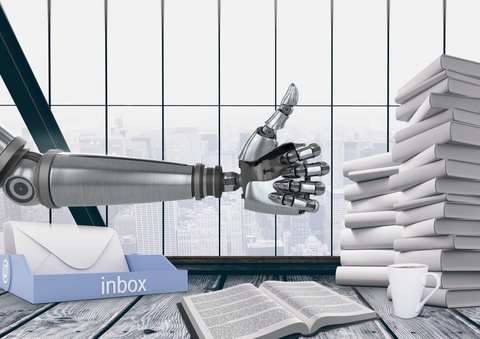 Since AI first started hitting the news, I’ve been completely fascinated. I was expelled from the womb as a science fiction nerd, and my earliest memories of reading anything besides Nancy Drew stories were reading Isaac Asimov and Frank Herbert (who wrote the Dune series).
Since AI first started hitting the news, I’ve been completely fascinated. I was expelled from the womb as a science fiction nerd, and my earliest memories of reading anything besides Nancy Drew stories were reading Isaac Asimov and Frank Herbert (who wrote the Dune series).
I was an early 70s baby. My Grandparents mostly raised me. My grandmother (also a sci-fi fan) shared her old Amazing Stories Magazine and Analog Science Fiction and Fact Magazines from the 20s and 30s. She had boxes of them she had saved, and I happily feed my psyche on those and her set of pretty much every book Edgar Rice Burroughs ever wrote. And for those who identify Burroughs with just Tarzan, 3/4s of his works were sci-fi, including a few of the Tarzan novels. As I got older, I still loved the books by Burroughs but despised the author for his beliefs. (But that’s a topic for another time).
I have many happy memories of growing up talking about science and science fiction with her. Not all of you may recognize these shows, so I encourage you to look them up for a laugh for a couple of them. I grew up on shows like the Gong Show, The Odd Couple, Nova (I loved Carl Sagan’s voice and listening to him talk about space, time travel and science fiction, and science fact), and of course, Star Trek reruns, I think that accounts for a lot of my rather wonky personality at times. And, of course, as a kid, I watched the cartoon the Jetsons.
It puts into perspective those old stories written 50 years before I read them in the 1970s; so much of what was pure fiction that authors wrote about that they didn’t see happening for centuries has happened within the last few decades.
Look how much has changed in the last 50 years; the cartoon, the Jetsons in 1962, had a meal replicator, we now have 3D food printing, and Elroy Jetson had a smartwatch, and he could watch TV on his wristwatch. How cool was that, then? How cool is that now?
Star Trek came out in 1966. Star Trek had the first mobile phones. In the show, known as the handheld communicator, aka a cell phone.
But that doesn’t hold a candle to AI. But it’s tied to it. Artificial intelligence is generally tied to computers but also robots.
Not everyone is a Sci-fi fan, but I’m going to throw out a bunch of examples of AI in TV and the movies, and most of you will probably have heard of at least one.
Examples of good artificial intelligence:
Johnny 5, Short Circuit
The Iron Giant
C-3PO, Star Wars
The Robot, Lost in Space
Vision, The Avengers
Lt. Data, Star Trek
Bad or evil artificial intelligence:
HAL 9000, 2001: A Space Odyssey
T-800, The Terminator
The Sentinels, The Matrix
The Gunslinger, West World
Ultron, The Avengers
The Borg, Star Trek
Wait, I said Evil. Can Artificial Intelligence be evil? Good question.
Was the original terminator evil? Well, it wasn’t an AI directly, Skynet was sentient, so that one is debatable. Skynet started a war because it didn’t want to be deactivated. Technically, if it were a human being, it would be the equivalent of not wanting to be killed.
In many cases, the “bad/evil” AI’s motivations were that it didn’t want to be killed/deactivated. From a human perspective, it’s understandable.
And then you take cases of movies like Lawnmower Man’s Jobe or Virtuosity’s SID 6.7, which puts a bit of spin on things. Jobe starts as a human and then basically merges with the machine. Is that AI? It’s an intelligent machine, so technically yes, but technically no, because it started as a human that went bad.
In Virtuosity, SID 6.7 is a digital blend of some of the worst killers out there in digital format that ends up as an actual real-world villain that goes on a killing spree. Sid is also threatened with being shut down. Is this a real AI with true sentience? Fear of being killed as a motivation, or is it a program based on some terrible people which acts out its base programming when given the opportunity? Why does it exhibit rage or glee if it’s just a program? That one never quite gets answered.
Can an AI be good or bad? Also, a good question!
We don’t know. That can be a philosophical, religious, scientific debate, or all three.
In many examples of “evil” AI, it’s a computer deciding the world would be a better place without humans. Well, are they wrong?
And this is not an argument about whether human beings should be around; it’s a rhetorical question meant to make you think.
I want to explore this for a moment and tell you what I think are three things that make people fear Artificial Intelligence and that are stimulating our flight or fight responses.
First, AI currently is not sentient, meaning it “thinks” based on the input it’s given. It can problem solve, but it’s based on the data it has access to. I think people fear this regardless of whether it can pass the Turing test or not. Like news highlighting Bing’s AI, which according to some journalists, has a mind of its own. Many people think AI means it actually “is” intelligent and free thinks.
The Turing test, originally called the imitation game by Alan Turing in 1950, is a test of a machine’s ability to exhibit intelligent behavior equivalent to, or indistinguishable from, that of a human. That doesn’t necessarily mean it’s intelligent and has self-awareness. It just means it’s enough to convince most people. And that’s pretty scary. It’s enough to be disturbing and make people uneasy.
Humans do away with each other, we do away with other species, and we damage the planet we live on. If a AI, regardless of whether it was self-aware or not, evaluated whether we are good for the planet or not, what do you think it would decide? And so we are afraid. It makes me afraid as well.
The second fear is we also run into something called the uncanny valley. We see it on tv shows and movies when a robot looks human, like Arnold Schwarzenegger in the Terminator, Arnie plus a ton of makeup to make him look a little “fake”. We see it in recent films like a recent horror movie called M3GAN, about a murderous child robot. In those cases and in most movies where it’s a AI robot on TV or in the movies, it’s also really a person “playing” a robot, which is disturbing enough by itself.
But we actually do see the uncanny valley in CGI in movies where things don’t “quite” look right all the time or in hyper-realistic video games. The news doesn’t help when they spotlight Boston Dynamics Robot Dogs Dancing or interview Sophia from Hanson Robotics on TV or news on the net.
The uncanny valley is an unsettling feeling people experience when robots and audio and/or visual simulations closely resemble humans (or, in the cases of the robot dogs, actual animals) in many respects but are not quite convincingly realistic, but it’s enough to make you feel uncomfortable and raise your hackles.
You may have heard of the news about deep fakes, where a person is basically digitally cloned by AI and other software, and the concern is that news will become even more questionable than it is now because you won’t know what is genuine and what is fake.
Our popular media hasn’t been helping pushing movies and shows highlighting the scare factor. The FTC recently came out with an alert about AI helping clone people’s voices based on finding public videos that out there and scamming people. That is super scary in itself.
The third fear is that AI will supplant people’s jobs, and I want to explore the pros and cons of what AI can do for businesses and the pros and cons of doing it as I see the potential it gives us. As stated in the title, this was part one; stay tuned for part two in my next blog post, where I’ll talk about AI for business, what it can do, what can’t it do and whether we should be scared of it or embrace it.
And in terms of AI taking over the world. AI, according the Oxford Dictionary, states:
Noun: artificial intelligence; noun: AI
The theory and development of computer systems able to perform tasks that normally require human intelligence, such as visual perception, speech recognition, decision-making, and translation between languages.
Key in on “perform tasks that normally require human intelligence” AI does NOT mean it’s actually intelligent and self-aware and is going to take over the world and do away with humanity. That “may” come down the road, but it’s not here “yet”. But we still fear the unknown and again popular media doesn’t help when they feed the fire of our fears.

Indeed! I wonder what he would think about what’s going on now!
This is so above my head. Although I was reading Nancy Drew, I was not reading science fiction. I did enjoy the Jetsons, but my only recent application of what I saw there was at the O-Town restaurant in O’Fallon, Illinois. I could almost see Rosie delivering the dinner trays to each table.
I was very impressed!
I seem to recall that the in-story explanation for Asimov’s three laws of robotics was that a horrified populace refused to allow robotics to be developed without them. Such an optimist!